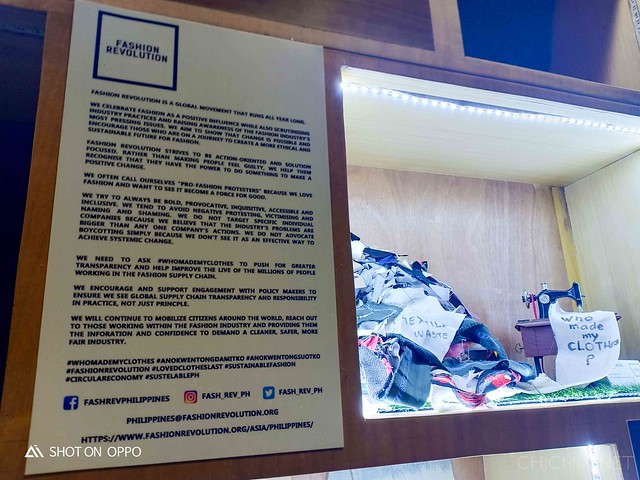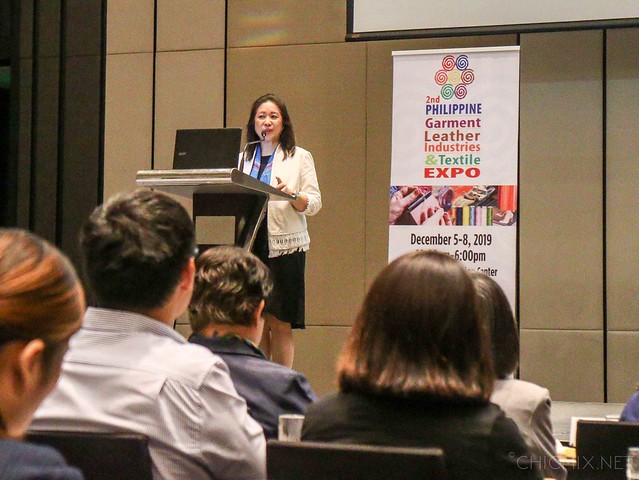Practicing Sustainability in our local Fashion Practices with Philippine Garment, Leather Industries and Textile Expo Forum
 "Sustainability" is such a big word, and an even bigger advocacy to accomplish. Especially in the garments and textiles market, where with the abundance of fast fashion the past decade, we have a LOT of trashed up clothes that are used once, discarded and mostly seen in the dumps. The situation is as bad as plastic, with the process of creation as equally heavy of carbon footprint as with it's end- all in the dumps and trash.
"Sustainability" is such a big word, and an even bigger advocacy to accomplish. Especially in the garments and textiles market, where with the abundance of fast fashion the past decade, we have a LOT of trashed up clothes that are used once, discarded and mostly seen in the dumps. The situation is as bad as plastic, with the process of creation as equally heavy of carbon footprint as with it's end- all in the dumps and trash.

While the damage has already been done, there is still hope as we continue to try and fix the problem that fast fashion has caused. Use what you produce; produce what you use. This very principle is what ushered the Department of Science and Technology-Philippine Textile Research Institute (DOST-PTRI) to pursue sustainability in local fashion practices. This is discussed in an industry forum which coincide with the opening of the recent Philippine Garment, Leather Industries and Textile Expo.
Philippine Garment, Leather Industries and Textile Expo Forum

The forum was held at the nearby Conrad Manila Hotel, Forbes Ballroom 1. Leading the talk on Fashion, Sustainability and how it affects the Philippines are Celia Elumba, Director IV of the DOST – Philippine Textile Research Institute (PTRI), and a detailed talk on sustainable and inclusive business models in the Philippines by Chief Executive Officer of Ananas-Anam Philippines Chuck Lazaro and Founder and Creator of Maison Metisse Adrienne Charuel. Know more about Maison Metisse below.

 |
| Maison Metisse literally means home and a woman of mixed ancestry. Maison Métisse is inspired by this concept and expresses the kind of woman a métisse is. #Mestizas in the house anyone? |
“Sustainability is producing our own textiles because it’s higher in the value chain. Using our own raw materials, having our own local skills and talents, and using our technology and processing here—it’s an industry that can enable more people to come to the workforce,” shares PTRI director Celia Elumba.
Technologies and raw materials and technologies now readily available in the Philippines, it is obvious that the Philippines’ garment sector is ripe for revitalization. “We have the technology. Now we’re looking for adaptors of it,” says Elumba. “We want to encourage enterprises, businesses, and investors to go and take a second look at textile production because we have more than a hundred million Filipinos now to market to.”

The long term goals of the PTRI is for the Philippines to be a part of the top 10 exporters of garments in the world, but they also point out that they want to do this while being sustainable. With exports amounting to 1.02 billion USD in 2017, the textile, garments, and other wearable industries, the Philippine economy is set to grow in these areas with continued investment.
One example of a sustainable model is the Regional Yarn Production and Innovation Center (RYPIC) in Miag-ao, Iloilo, where PTRI collaborated with the Iloilo Science and Technology University (ISAT U) to create a microscale facility that produces blended yarns that assists small and medium enterprises (SMEs).
 The project, which is supported by the local government of Iloilo, uses natural materials available in Iloilo—positively impacting the environment by not leaving microfibers in the water when washed. In keeping with PTRI advocacy TELA (Textiles Empowering Lives Anew) Pilipinas, they have also partnered with Great Women Philippines to create and market products commercially and further promote locally made quality textiles.
The project, which is supported by the local government of Iloilo, uses natural materials available in Iloilo—positively impacting the environment by not leaving microfibers in the water when washed. In keeping with PTRI advocacy TELA (Textiles Empowering Lives Anew) Pilipinas, they have also partnered with Great Women Philippines to create and market products commercially and further promote locally made quality textiles.
They plan to sort their long term goals by:
- Improving Product Marketing and Promotion
- Strengthening the industry's market presence by the use of social media and the like
- Tap LGUs to promote locally produced garments in their area, much like how Baguio, and Benguet is thriving with the textile industry, weaving techniques and patterns of their tribes.
- Strictly enforce RA 9242 Phiippine tropical fabrics law and have localized suppliers for the uniform of civil servants.
In the end really, it all boils down to "Buy Filipino, Buy Local" movement.

Which brings us to the happenings at the recent Philippine Garment, Leather Industries and Textile Expo last 5-8, at the SMX Convention Center, Mall of Asia Complex, Pasay City. The Expo Gathered manufacturers, retailers, wholesalers, and stakeholders to help boost the country’s potential in producing garments, leather goods, and textiles for export. Local companies who are in pursuit of trying to encourage the "buy filipino" movement is definitely there as well, to showcase their product, and their advocacy.
How to practice sustainability in our clothes, in everyday lives
Personally, our efforts as a consumer would mean a lot. Like double checking for the durability of fabric by reading what it is made of. By making sure that the products we buy are more than just a passing fancy. That we will actually be wearing our clothes more than 20x in it's lifetime, and even then trying to reconstruct them into something else that's also useful. By buying local too. Because we have some really sturdy and yet biodegradable textiles that can help out not just us, but the environment as well.

The Expo is organized by CP Exhibition LTD, a company that was established in Hong Kong in 1976 and has representative offices in Canada, France, Germany, India, Italy, Japan, Korea, Pakistan, Russia, Singapore, Taiwan, UK, USA and Vietnam. CP Exhibition has organized trade exhibitions in different areas such as Textile/Garment/Fabric, Aviation, Transport, Railway/Subway, Oil/Gas, Coal, Electricity, and others.
Co-organized by Philippine Exhibition and Trade Corporation (PETCO), the Philippine Garment, Leather Industries and Textile Expo is supported by Textile Producers Association of the Philippines (TEXPAP), LGU Marikina / Marikina Shoe Industry Development Office (MASIDO), Garment Manufacturer Association of the Philippines (GARMAP), DOST-PTRI, and Department of Science and Technology – National Capital Region (DOST-NCR); with radio partner 105.1 Crossover FM.

.jpg)

Thank you so much po sa tips ❤
ReplyDelete